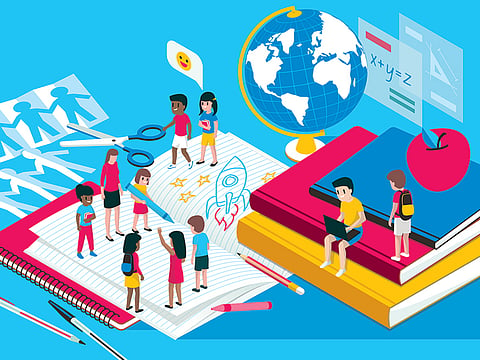How multiculturalism helps school education
Culturally sensitive methods of teaching are instrumental in creating an atmosphere that is comfortable and friendly for students

In the last few decades information technology has spread its ubiquitous web across the universe. The world is no more compartmentalised into narrow homogeneous demographics. It is now a global village with a multicultural population. Individuals and organisations can no longer indulge in the ostrich act and cling to prejudices regarding cultures that are different from their own.
Multicultural awareness is crucial to the growth and development of any organisation and more so in schools where values are inculcated and young minds are moulded. Inclusive education is the need of the hour and teacher sensitivity towards varied multicultural contexts and expectations is critical to foster positive classroom environments.
With greater outsourcing and the job market providing opportunities for aspirants across the globe, international schools with a diverse student population are burgeoning across the world.
It is therefore increasingly important for people to work collaboratively and with mutual respect in a pluralistic society. In such a scenario teachers can help develop and refine their cross-cultural pedagogy to cater to the needs of a diverse population of students.
Pertinently international schools are teeming with cultural diversity and on a daily basis teachers interact with culturally different students, colleagues, parents and community members. The mission statements of most schools encourage global citizenship as schools seek to intentionally promote diversity through an inclusive ethos.
Inspection and accreditation bodies lay emphasis on education for all groups of learners. Therefore differentiation becomes a high priority to ensure that schools receive a creditable rating. This means that inclusion not only includes students with special needs and talents but also students who belong to different nationalities and ethnicities.
What is more, teachers sensitive to the needs of all students help promote a culture of harmony, shared understanding, support and tolerance in their classrooms.
Research suggests that besides teachers’ curricular and instructional accommodations their cultural knowledge and awareness can make a major difference in student learning and engagement. Culturally sensitive pedagogy is instrumental in creating an atmosphere that is comfortable and friendly with students willingly engaging in classroom activities and discussions when they perceive their teacher to be more culturally competent.
Teachers’ unconditional positive regard for all students through support and trust is exponentially linked to high student engagement as students feel a sense of belonging and value in the classroom.
This filters down to the fact that inclusive school environments require a specialised approach that focuses on:
■ a student centred approach to motivate all groups of learners
■ creating an environment of mutual trust that builds self esteem
■ teaching students lifelong learning skills which include collaboration, peer support and accepting differing views and opinions
■ engaging students in challenging tasks that promote critical thinking and problem solving
■ providing adequate support to help students identify and achieve their innate potential
■ ensuring high expectations that demand sustained performance
Additional skills
As part of the teachers’ professional development it is of vital importance to ensure that these competencies form an integral part of their repertoire of culturally sensitive pedagogy along with additional skills that include curriculum content, learning climate, instructional strategies, and interpersonal interactions.
We are living in precarious times and the current global crisis has created an imperative for opening up borders and minds for people across the world who move either through choice or are forced to move through conflicts. Immigration creates an even greater demand for multicultural awareness as families and especially children grapple with the complexities of their situations. Teacher education needs to be explored from the perspective of preparing teachers to not only be pedagogically competent for diverse classrooms but also to be sensitised towards the need to foster an ethos of shared understanding, promoting emotional intelligence that will create reciprocal relationships among students from various ethnic backgrounds. Then and only then can educators across the world truly claim that education is an investment and our students are the assets that will make the world economy richer for having harnessed the innate potential within every child to be a global citizen by overcoming barriers such as caste, creed, ethnicity and cultural differences.
The UAE has been a case in point — a bustling country of multicultural awareness with a very diverse population estimated at 9.54 million (2018) of which a majority is made up of expatriates. The UAE is home to over 200 nationalities and its leaders are deeply committed to promoting cultural understanding and awareness and a vision of universal peace. The educational landscape offers enriched environment for cultural sensitisation to practicing educators with powerful insights.
Apart from the Ministry of Education (MOE), regulatory bodies across the educational sector in the UAE like Knowledge and Human Development Authority (KHDA) and Abu Dhabi Education Council (ADEC) are instrumental in conducting school inspections with differentiation being a key focus area and learning for all groups of learners being a mandatory requirement for an outstanding rating in school evaluations.
Multicultural competency is therefore an integral part of leadership training as this will be the first step towards laying the foundation of a pluralistic society that promotes tolerance and global harmony.
Dr Farooq Wasil is a noted educationist and author. He is the global head, low cost schools, GEMS Education, Dubai.


